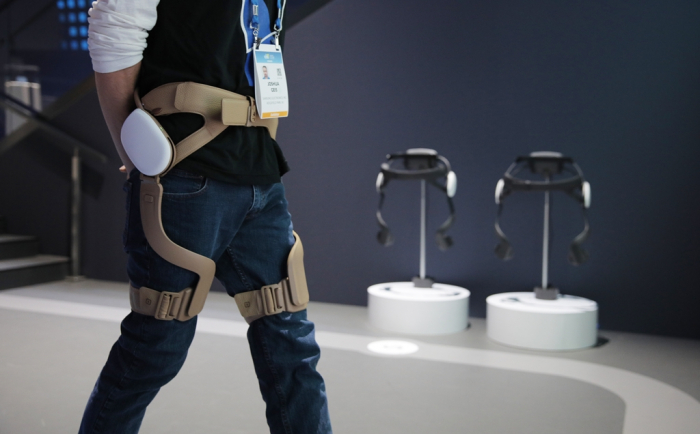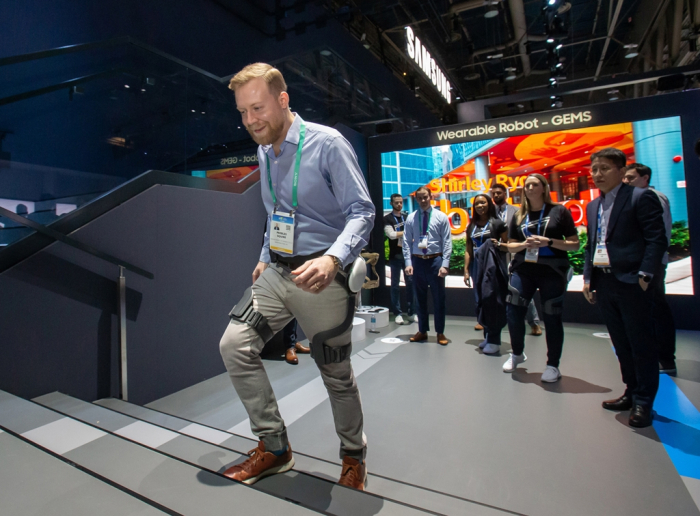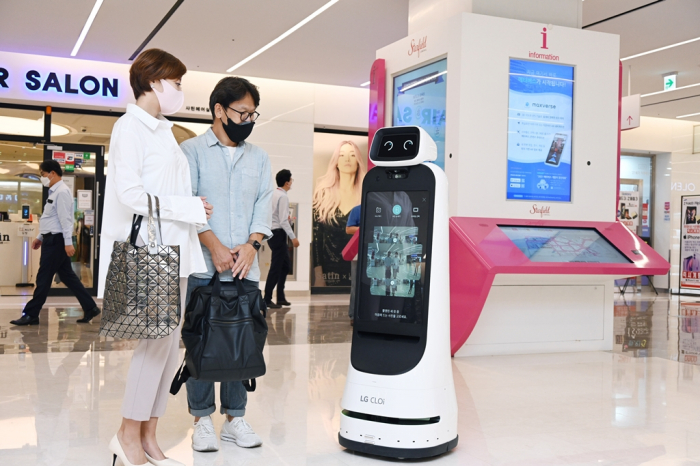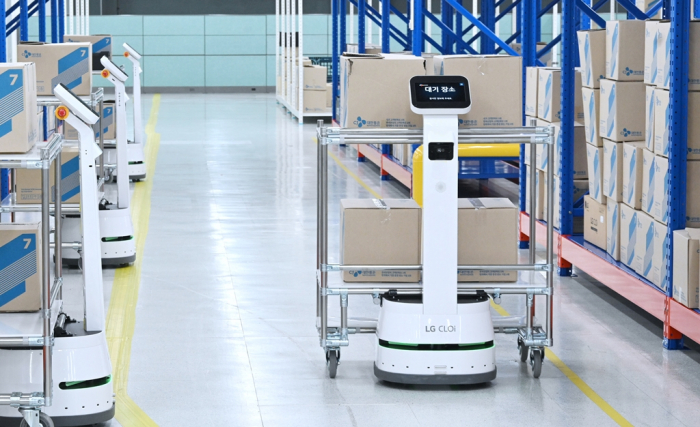Robotics
Samsung Electronics to launch its first robot EX1 this year to rival LG
The new wearable robot is said to be based on its exoskeleton walking aid machine GEMS Hips
By Feb 06, 2023 (Gmt+09:00)
2
Min read
Most Read
LG Chem to sell water filter business to Glenwood PE for $692 million


KT&G eyes overseas M&A after rejecting activist fund's offer


Kyobo Life poised to buy Japan’s SBI Group-owned savings bank


StockX in merger talks with Naver’s online reseller Kream


Meritz backs half of ex-manager’s $210 mn hedge fund



Samsung Electronics Co. will bring its first robot EX1 to market this year to compete with LG Electronics Inc., shifting its focus from traditional home appliances to take on its crosstown rival in the fast-growing robotics market.
The move builds on Samsung Vice Chairman and Co-Chief Executive Han Jong-hee’s announcement last year that the company will nurture robotics as one of its key businesses to drive future growth. The company also established a robotics business team in 2022.
“The time is ripe for us to commercialize service robots with the proportion of elderly in the population growing rapidly,” said a Samsung official.
The South Korean tech giant first unveiled a wearable exoskeleton robot, known as the gait enhancing and motivation system (GEMS), at the CES trade show in 2019. The company also developed three variations of the wearable robot; the GEMS Hip, the GEMS Knee and the GEMS Ankle. But it didn’t commercialize the robots at the time.

Samsung provided no details on EX1, but industry watchers said the new wearable robot, to be based on the exoskeleton walking aid robot GEMS Hips, will assist users who have trouble walking, running or standing up, and can also be used as a fitness device.
TO INTENSIFY ROBOTIC RIVALRY WITH LG
Samsung’s move to strengthen its robotics business is expected to intensify competition in the local robotics industry.
LG Electronics entered the robotics market in 2017 by launching a series of robots under the CLOi brand that deliver food or make coffee.

Starting with the launch of CLOi GuideBot which guides passengers at the airport, LG has so far released seven types of CLOi robots, which largely assist human employees at restaurants, hospitals, libraries and logistic centers.
Unlike LG, Samsung will initially focus on healthcare robots for the elderly, according to industry officials.
Earlier this month, Samsung acquired 10.3% of Rainbow Robotics Co., a Korean collaborative robot maker, for 59 billion won ($46 million).
Collaborative robots are intended for direct human-robot interaction within a shared space, or where humans and robots are in close proximity. Those robots are getting more advanced with artificial intelligence and big data.

Rainbow Robotics is also developing products such as quadruped walking robots, bipedal platforms and autonomous mobile robots with Hyundai Rotem Co., a unit of Hyundai Motor Co.
Last June, LG signed a business tie-up with CJ Logistics Co. to jointly develop a next-generation logistics robot. In October, LG also signed an initial agreement with local AI logistics platform provider Fassto Corp. to cooperate on the development and supply of logistics robots.
According to Brandessence Market Research & Consulting, the global service robot market is forecast to grow from $35.2 billion in 2021 to $140.9 billion by 2027.
Write to Ji-Eun Jeong at jeong@hankyung.com
In-Soo Nam edited this article.
More to Read
-

-
 RoboticsLG, KT join forces to launch next-generation service robots
RoboticsLG, KT join forces to launch next-generation service robotsAug 17, 2022 (Gmt+09:00)
2 Min read -
 Future mobilityLG, Kakao Mobility to roll out autonomous delivery robot service
Future mobilityLG, Kakao Mobility to roll out autonomous delivery robot serviceJun 22, 2022 (Gmt+09:00)
1 Min read -
 Corporate restructuringSamsung launches merged set division as DX; robotics new growth driver
Corporate restructuringSamsung launches merged set division as DX; robotics new growth driverDec 12, 2021 (Gmt+09:00)
4 Min read -
 RoboticsSamsung Electronics to market wearable robot for healthcare by year-end
RoboticsSamsung Electronics to market wearable robot for healthcare by year-endJun 15, 2021 (Gmt+09:00)
2 Min read
Comment 0
LOG IN


